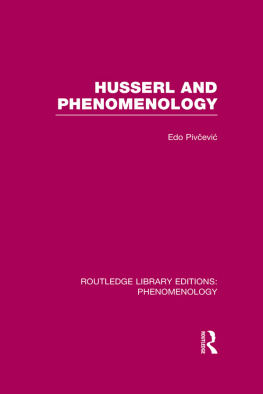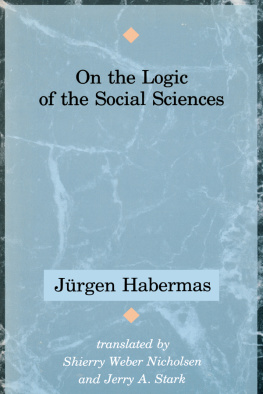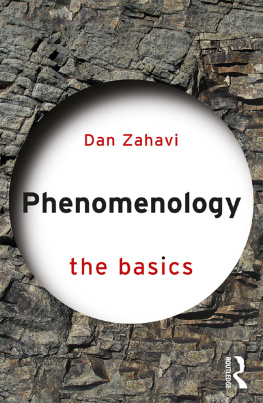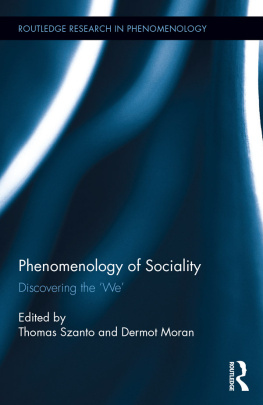ROUTLEDGE LIBRARY EDITIONS:
PHENOMENOLOGY
Volume 6
PHENOMENOLOGY, LANGUAGE AND THE SOCIAL SCIENCES
PHENOMENOLOGY, LANGUAGE AND THE SOCIAL SCIENCES
MAURICE ROCHE
First published in 1973
This edition first published in 2014
by Routledge
2 Park Square, Milton Park, Abingdon, Oxon, OX14 4RN
Simultaneously published in the USA and Canada
by Routledge
711 Third Avenue, New York, NY 10017
Routledge is an imprint of the Taylor & Francis Group, an informa business
1973 Maurice Roche
All rights reserved. No part of this book may be reprinted or reproduced or utilised in any form or by any electronic, mechanical, or other means, now known or hereafter invented, including photocopying and recording, or in any information storage or retrieval system, without permission in writing from the publishers.
Trademark notice: Product or corporate names may be trademarks or registered trademarks, and are used only for identification and explanation without intent to infringe.
British Library Cataloguing in Publication Data
A catalogue record for this book is available from the British Library
ISBN: 978-0-415-83854-2 (Set)
eISBN: 978-0-203-79854-6 (Set)
ISBN: 978-0-415-70302-4 (Volume 6)
eISBN: 978-0-203-76280-6 (Volume 6)
Publisher's Note
The publisher has gone to great lengths to ensure the quality of this reprint but points out that some imperfections in the original copies may be apparent.
Disclaimer
The publisher has made every effort to trace copyright holders and would welcome correspondence from those they have been unable to trace.
Phenomenology, language and the social sciences
Maurice Roche
Routledge & Kegan Paul
London and Boston
First published in 1973
by Routledge & Kegan Paul Ltd
Broadway House, 68-74 Carter Lane,
London EC4V 5EL and
9 Park Street,
Boston, Mass. 02108, U.S.A.
Printed in Great Britain by
The Lavenham Press Ltd.
Lavenham, Suffolk.
Maurice Roche 1973
No part of this book may be reproduced in
any form without permission from the
publisher, except for the quotation of brief
passages in criticism
ISBN 0 7100 7546 4
Library of Congress Calalog Card Number: 73-79112
Contents
In modern philosophy there have been a number of self-styled revolutions and movements. This book is an examination of two of them, phenomenology and conceptual analysis (or ordinary language philosophy). The main questions it tries to answer are these. What are the views of the two schools on the explanation and understanding of thought and action? Are they similar to each other in any important respects? And how do such views relate to psycho-logical and sociological analyses of thought and action?
Answering the first question has called for a fairly detailed description and analysis of the main texts and arguments of the two schools. This provides for the answer to the second question above, viz. that the two schools are similar in important respects, to be proposed. The overall argument here is that phenomenology and conceptual analysis have what may be called humanistic features in common. Both are opposed to the application of natural scientific procedures, theories, analogies and aspirations in the human and social sciences. They are particularly opposed to the mechanism and reductionism of philosophical standpoints like logical positivism or empiricism. Both advocate a descriptive approach to human experience as an important method for philosophy and the social sciences. And finally both can be seen to rely on virtually the same theory of man.
Their common humanism, like that of the young Marx, thus appears in their theories of knowledge and of being. Other more loose and less analysable usages of humanism, in anti-theological moralising for instance, are not relevant to our use of the term here.
The third question mentioned above concerns the relation of this humanistic philosophy to the social sciences, here understood to include psychology as well as sociology. The overall argument advanced is that psychological theories tend to be mechanistic .
Even conventional and classical sociology has significant humanistic elements, in spite of its too common positivistic and scientistic veneer. This veneer, generated in particular by the institutionalisation of sociology as a profession in the United States, has been cracking up and falling away in recent years. Minus the veneer, sociology reveals itself as singularly lacking in solid achievements, and as naively unaware of the implications of its entanglements with the buyers of information and the manipulators of men, and as profoundly and inextricably enmeshed in everyday common-sense reasoning.
By making clear the nature of the humanistic philosophical critiques of psychology and sociology, I hope to add a few more voices to the rising tide of criticism of the blinkered pretensions of conventional sociology which reflect, where they do not serve, the dehumanising features of mature capitalist society. This is not at all to recruit Wittgenstein, Husserl and the others with whom I am concerned in the book, to the role of social criticism and radicalism. The imaginative re-writing of philosophical history which that would require is beyond me. But it is to indicate the complex problem of mutual relations of philosophy, sociological knowledge and social reality. At the very least, philosophy always has some degree of autonomy vis vis social reality, some degree, however minimal, of transcendence. Humanistic philosophy may well be analysed by sociology as being a parasite on the scientific culture of a secular, rational, technological society, or further as bourgeois ideology. But then sociology itself is subject to the same sociological analysis. And like sociology, philosophy is never merely parasitic and only ideology. The philosophy of a society like the religion of a society and like the madness of an individual is never merely a symptom, a reflex response. It is, like religion and madness, a form of consciousness. And forms of consciousness, given that they are intrinsically social, as we will observe in the course of our argument, have a degree of autonomy and integrity in their internal structures of meaning. A humanistic sociology lives with the complexity that this imposes on its so-called sociology of knowledge, without dissipating or reducing that complexity. And part of this complexity is the fact that the philosopher's argument besides being sociologically explained can be listened to as having implications for sociology's self-consciousness, if not for its practice. Periods of re-evaluation of belief systems and their methods necessarily involve an inherently philosophical maneouvre of going back to basics. The present is such a period of re-evaluation for the belief systems and practices comprising sociology. And as such it requires, besides political critiques of sociology as a practice, philosophical critiques of sociology as a belief system. Its beliefs concern social action and social structures, their relations and the methods most appropriate for their study. The humanistic philosophies of phenomenology and conceptual analysis have important arguments concerning these topics which thus deserve the sociologist's attention. The emergence within sociology of a movement like ethnomethodology, whose various proponents explicitly invoke the terms and concepts of both schools, adds to the necessity for the sociologist to do more than merely explain away phenomenology and conceptual analysis. He must, besides, try to understand them. The clarification and criticism of the two schools that is attempted in this book is addressed to this need for sociology to understand and to come to terms with humanistic philosophy.
Next page







